SUMMARY
This is AI generated summarization, which may have errors. For context, always refer to the full article.
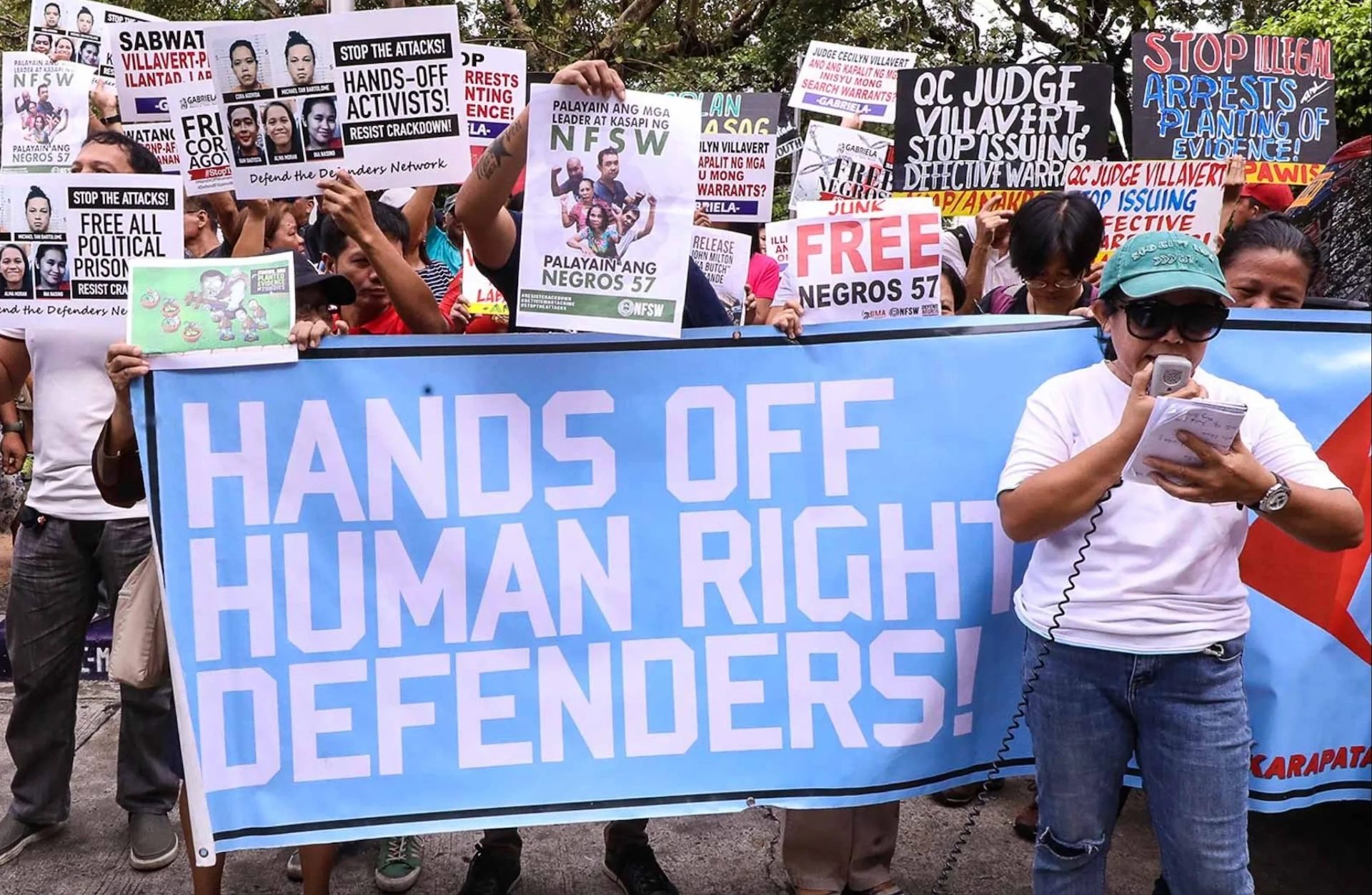
MANILA, Philippines – Night time signals different things to different people. It can mean the end of a long tiring day, with one’s own bed as refuge from the chaos of work. But for many human rights workers, dusk triggers fear over what could happen given the rampant harassment they have endured over the years.
Youth activist John Garcia has learned to live life maneuvering around the threats he faces. He even had to impose a curfew on himself, driven by trauma, anxiety, and worry not just for himself, but also for the people around him.
“I just don’t feel safe kapag mag-isa ako at nasa labas ako kapag gabi na,” Garcia, the chairperson of Youth Advocates for Peace and Justice (YAPJUST) in Los Baños, Laguna, told Rappler on Wednesday, July 27.
“Kapag napapadaan ako sa streets na mag-isa lang ako kapag gabi, I really try to look around kung meron ba na nakasunod, meron ba nagsu-surveillance,” he added.
(I just don’t feel safe to be alone and outside at night. When I pass by streets alone at night, I try to look around to see if someone is following me or if someone’s doing surveillance.)
Garcia’s fears are not unfounded as the extent of the violence inflicted – often by state forces – on human rights workers is common knowledge. As a volunteer paralegal for rights group Karapatan, he has come face-to-face with unprecedented levels of intimidation and harassment.
One instance was when his full name and address were posted on Facebook by a page linked to a military unit in Calabarzon, the region where Bloody Sunday raids that left nine activists dead happened.
It was posted after he went to the military camp to help a family retrieve the remains of a slain individual in a different incident. The post – which also tagged Karapatan as a communist front organization – was shared widely by different military-linked Facebook pages.
“I fear that they’d go to me or my family in our home address and intimidate us, harass, or worse, do things that they’ve done to other human rights workers, like illegally arrest or even kill me,” he said.
“I know kung gaano kalala ang kayang gawin ng mga sundalo sa mga kagaya naming human rights workers, nakita ko na anong mga nangyari sa mga kasong iyon,” Garcia added.
(I know the extent of bad things soldiers can do to us, human rights workers; I have seen what happened in those cases.)

Addressing issues
In an ideal world, human rights defenders do not have to fear reprisals as they carry out their vital work. What they are doing – promoting human rights, ensuring that these are protected – are within the bounds of the law and are explicitly stated in various legal instruments.
But this is the Philippines where a culture of impunity has reigned supreme over the past six years of former president Rodrigo Duterte, a staunch adversary of anything related to human rights – from the concept that is the center of democracies to people who work hard to fight for it.
The Commission on Human Rights (CHR), in fact, has said in a 2020 report that Duterte created a “dangerous fiction” that made the Philippines dangerous for human rights defenders. He made it “legitimate to hunt down and commit atrocities against [defenders]” because of the false notion that they “are enemies of the state.”
Also in 2018, the United Nations (UN) listed the Philippines as one of 38 countries where governments subject human rights defenders and activists to “an alarming and shameful level of harsh reprisals and intimidation.”
The effect of Duterte’s violent rhetoric and policies will continue to be felt long after his stepping down from office on June 30. The trail he left from the time he left Malacañang is not only bloody, but also littered with shreds of the public’s understanding of human rights.
This is what legislators like Albay 1st District Representative Edcel Lagman and the Makabayan bloc – including Kabataan Representative Raoul Manuel, ACT Teachers Representative France Castro, and Gabriela Representative Arlene Brosas – want to counter.
House Bills 00077 (filed by Lagman) and 00256 (filed by the Makabayan bloc) – both called the Human Rights Defenders Protection Act – seek to put in place mechanisms that will promote and protect the rights and freedoms of human rights defenders in the Philippines.
For example, under the proposed bill, human rights defenders have the right against “defamation, stigmatization, and vilification,” as well as the right to effective remedy and full reparation in the case of proven violation of these provisions.
Read the full rights and freedoms stated in the two proposed bills below:
The proposed bills also emphasize the role of the government in not just ensuring the promotion of these rights, but also the protection of human rights defenders.
For example, the state has an obligation to "enforce and institutionalize command responsibility and impose sanctions against errant superior in both military and civilian agencies," as well as an obligation to adopt human rights-based governance, among others.
Read the full state obligations below:
To address possible violations and to monitor the implementation, the proposed bills also seek to establish a human rights defenders protection committee composed of one chairperson and six members jointly nominated by Philippine-based organizations.
This is not the first time legislators sought to pass a bill protecting human rights defenders. The House of Representatives passed similar bills during the 17th and 18th Congresses, but the Senate version filed by then-senator Leila de Lima did not progress.
United Nations special rapporteur on human rights defenders Mary Lawlor has repeatedly sent communications urging legislators to pass the law given how “highly dangerous” the Philippines is for human rights workers, evident in the number of attacks recorded over the years.
A “properly resourced, robust, independent and well-funded mechanism that incorporates a gender perspective” can significantly improve not just their work, but also their welfare.
“National legislation recognizing the work of human rights defenders is an important means by which States contribute to the effective implementation of the UN Declaration on human rights defenders,” she told Rappler on Monday, July 25.
There is still no clear indication whether or not there will be significant developments in the 19th Congress, especially as the only opposition legislator in the Senate with a clear track record on human rights is Senator Risa Hontiveros.
Lagman, however, said he will still try to talk to other “kindred senators” who may be able to support the bill.
He also pointed out that they expect less opposition from the Senate, given that Panfilo Lacson, the author of the anti-terror law, which Lagman called “a derogation of human rights,” is no longer an incumbent senator.
Outside the hallowed chambers of Congress is an entirely different question. The fate of the bill lies in the hands of President Ferdinand Marcos Jr., a strong ally of former president Duterte, and whose father’s Martial Law regime was characterized by human rights violations.
“A major challenge to the bill’s passage is [Marcos] himself who did not even mention in his SONA his position on the protection and fulfillment of human rights,” he told Rappler on Tuesday, July 26.
During the previous administration, opposition to the proposed bill came mostly from the controversial National Task Force to End Local Communist Armed Conflict (NTF-ELCAC). In the past years, its officials said that such legislation is redundant as there are already other ways to protect human rights and their defenders.
But this is not the case, according to National Union of Peoples' Lawyers president Edre Olalia.
“If there are enough and effective laws, then why are attacks against human rights defenders rampant, prevalent, and done with impunity?” he told Rappler.
Human rights defenders continue to face reprisals and be subjected to harassment over their work. As of December 2021, rights group Karapatan documented 427 incidents of killings and at least 537 recorded incidents of frustrated killings since July 2016. Meanwhile, at least 1,161 activists have been arrested and detained over the past six years.

Kabataan Partylist Cavite spokesperson Jet Magtira has experienced and recorded at least six incidents against human rights defenders and activists since November 2021 – or the past eight months alone.
These include blatant harassment during protest actions and intimidation tactics during outreach programs, where state forces would not just question their motives, but also outrightly prevent them from carrying out their planned activities.
Magtira also had to deal with online incidents, including Facebook accounts trying to extract personal information about him from his family and friends.
Just last July 10, a Facebook account reached out to his father’s online business under the pretense of being a customer. It became suspicious when the line of questioning turned personal.
“Tinatanong na niya ang tatay ko kung anak ba niya ako, sumagot naman siya na oo, tapos biglang tinatanong na kung nasaan raw ba ako at that time eh nagkataon na nasa isang community integration ako. Pati exact address namin gusto kunin,” he said.
(He asked my father if I was his son, and my father said yes. And then he suddenly started asking where I was at that time, and it so happened I was in a community integration. And then he wanted to get even our exact address.)

Magtira took it upon himself to check the person’s profile, even if at that point his father unfortunately already divulged some details, including their address. The man, whose Facebook account only had 22 friends, said he was interested to join Kabataan but suspiciously wanted to first meet in person.
“Nakakalungkot na nakuha iyong address namin kaya isang kahirapan na naman iyon para sa akin kasi hindi na ako basta-basta puwede makauwi kasi mamaya baka kung ano na ang nag-aabang sa akin sa bahay,” he said, adding that it has affected his mental health already.
(It’s sad that he got our address because that’s an added burden for me since I won’t be able to just go home without worrying about what awaits me at home.)
Recognizing rights workers
The experiences of Kabataan’s Magtira and YAPJUST’s Garcia, both youth human rights workers, are just two of countless incidents that many of their peers and colleagues have faced over the years. The idea of a law that will protect them is a welcome development amid rampant harassment.
“Ang nangyayari kasi ngayon, on the ground, we know our rights pero kailangan pa ng negotiations when we assert sa harap ng estado kaya if may ganitong batas, may panghahawakan kami,” Garcia said.
(What’s happening on the ground is that we know our rights, but we still have to do negotiations to assert ourselves before the state. So if we have this law, we have something concrete to cite and show them.)
CHR is also hopeful that the current roster of legislators will help make sure the bill becomes law, especially as there is indeed a need to establish concrete protection mechanisms for human rights defenders.
“We reiterate that it is the primary obligation of the State and public authorities to protect, promote, and fulfill human rights,” CHR spokesperson and executive director Jacqueline de Guia told Rappler.
“Human rights advocates must therefore be seen as allies, and not adversaries, in the realization of our universal and constitutional liberties,” she said.
For Magtira, the most important thing that the proposed bill could do, if passed into law, is to finally recognize the vital work of human rights defenders and secure their place in Philippine democracy.
“Isolated pa rin at hindi kinikilala ang mga paralegals at human rights workers, hindi lubos na kinikilala ng batas at gobyerno, kaya sa aspeto na iyan kailangan pa ng puspusang paggigiit na i-recognize ng batas at gobyerno ang human rights work.,” he said.
“In case na may mangyari, meron tayong panghahawakan at may batas na magpo-protekta doon sa mga nagpoprotekta ng human rights,” Magtira added.
(Human rights defenders and paralegals are still isolated and not recognized, not fully acknowledged by the law and government, that's why we still have to push back and assert that the law recognize human rights work. In case something positive happens, we would have something to hold on to and there would be a law to protect those who protect human rights.) – Rappler.com
Add a comment
How does this make you feel?





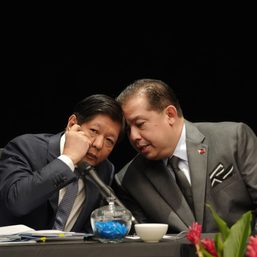





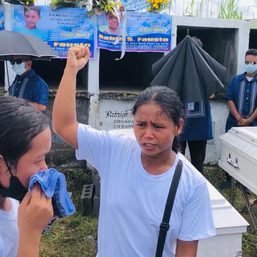









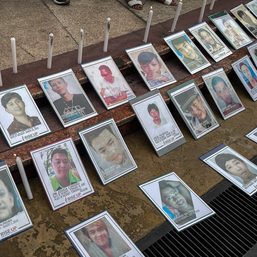
![[EDITORIAL] Sorry Arnie Teves, walang golf sa kulungan](https://www.rappler.com/tachyon/2024/03/animated-arnie-teves-arrest-carousel.jpg?resize=257%2C257&crop=310px%2C0px%2C720px%2C720px)
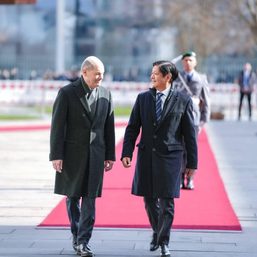
There are no comments yet. Add your comment to start the conversation.